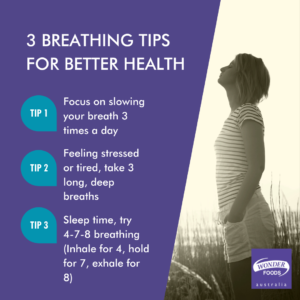It’s after lunch and you’re yawning a lot again. Stuck at your desk or stopping after a busy morning, what can you do to help your energy levels?
Easy—just breathe with conscious control. What do I mean?…. All will be revealed.
How regular breathing works
As we inhale, air enters the lungs while oxygen from the air moves into our blood. Simultaneously, carbon dioxide moves from our blood to the lungs and is exhaled. This is called gas exchange.
Diaphragmatic breathing involves contraction of the diaphragm, expansion of the belly, and deepening of inhalation and exhalation, which slows down respiration and increases the amount of gases in the blood. If we breathe with this kind of control and deepen the in and out breath, it tends to alleviate fatigue.
Ancient meditation practices based on breath work can certainly keep the mind and body in good health. But did you know that simply focusing on the breath in a mindful way can slow down breathing rates and make you feel more relaxed?
The Many Benefits of Breathing from Your Diaphragm
Deep breathing is a good practice for when life gets a bit too much. When our mind and body is under stress, we are more likely to breath in shallow spurts and this can affect the body by increasing cortisol and preventing oxygen flow.
Some of the many health benefits from using the breath in a more conscious way are:
- Reduced stress levels
- Decreased fatigue
- Lowered heart rate
- Lowered blood pressure
- Reduced symptoms of asthma in children
- Reduced anxiety
- Improved migraine conditions
- Better manage the body’s reaction to stress and fatigue
Source: Health Science Journal review, 2011.
Some scientific studies of people who meditate with deep breathing have indicated correlations with lower oxidative stress levels and cortisol levels. This means that those who do this type of relaxed diaphragm breathing exercises regularly may suffer fewer damaging effects from the stress hormones released in the body.
Do you need to do breathing practice for long?
Studies suggesting that practising pranayama breathing (controlling the breath) daily for six weeks can “improve a person’s heart rate variability, which correlates with stress, and also improves cognition and anxiety”.[1]
The main pranayama breathing practice is an alternate nostril-based breathing pattern, which can be practised sitting upright, but before lunch for this one. Try it for yourself when feeling tired and see if it makes a difference.
3 Breathing Tips for Better Health
Tip 1: Focus on your breath three times a day and notice it slowing.
Tip 2: When you feel stressed or tired, breathe deeply in/out the nose 3 times.
Tip 3: To relax for sleep, try 4-7-8 breathing. Inhale for 4, hold for 7, exhale for 8 counts.

[1] https://pubmed.ncbi.nlm.nih.gov/24968492/



